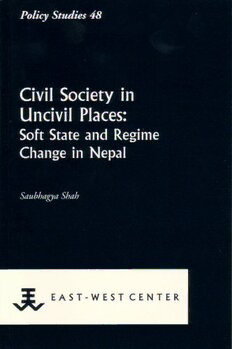Download Civil Society in Uncivil Places: Soft State and Regime Change in Nepal PDF Free - Full Version
Download Civil Society in Uncivil Places: Soft State and Regime Change in Nepal by Saubhagya Shah in PDF format completely FREE. No registration required, no payment needed. Get instant access to this valuable resource on PDFdrive.to!
About Civil Society in Uncivil Places: Soft State and Regime Change in Nepal
This monograph analyzes the role of civil society in the massive political mobilization and upheavals of 2006 in Nepal that swept away King Gyanendra's direct rule and dramatically altered the structure and character of the Nepali state and politics. Although the opposition had become successful due to a strategic alliance between the seven parliamentary parties and the Maoist rebels, civil society was catapulted into prominence during the historic protests as a result of national and international activities in opposition to the king's government. This process offers new insights into the role of civil society in the developing world. By focusing on the momentous events of the nineteen-day general strike from April 6-24, 2006, that brought down the 400-year-old Nepali royal dynasty, the study highlights the implications of civil society action within the larger political arena involving conventional actors such as political parties, trade unions, armed revels, and foreign actors. The detailed examination of civil society's involvement in Nepali regime change sheds light on four important themes in the study of civil society. The first relates to a clear distinction between civil society as a spontaneous philosophical and associational form in the West and its mimetic articulation in the developing. The second addresses the nature of the relationship between civil society and political society and the way the former generates its moral authority and efficacy based on claims to universal reason, knowledge, and techniques of polymorphous power. The third theme explores the connection between the ideological and material basis of civil society and distinguishes between its autonomous Western origin and the recent growth in the developing world. Finally, civil society is examined in the international area: the example of Nepal reveals ways in which civil societies in the developing world are burgeoning as alternative policy instruments in interstate relations. This is the forty-eighth publication in Policy Studies, a peer-reviewed East-West Center series that presents scholarly analysis of key contemporary domestic and international political, economic, and strategic issues affecting Asia in a policy relevant manner.
Detailed Information
| Author: | Saubhagya Shah |
|---|---|
| Publication Year: | 2008 |
| ISBN: | 9781932728767 |
| Pages: | 87 |
| Language: | English |
| File Size: | 0.336 |
| Format: | |
| Price: | FREE |
Safe & Secure Download - No registration required
Why Choose PDFdrive for Your Free Civil Society in Uncivil Places: Soft State and Regime Change in Nepal Download?
- 100% Free: No hidden fees or subscriptions required for one book every day.
- No Registration: Immediate access is available without creating accounts for one book every day.
- Safe and Secure: Clean downloads without malware or viruses
- Multiple Formats: PDF, MOBI, Mpub,... optimized for all devices
- Educational Resource: Supporting knowledge sharing and learning
Frequently Asked Questions
Is it really free to download Civil Society in Uncivil Places: Soft State and Regime Change in Nepal PDF?
Yes, on https://PDFdrive.to you can download Civil Society in Uncivil Places: Soft State and Regime Change in Nepal by Saubhagya Shah completely free. We don't require any payment, subscription, or registration to access this PDF file. For 3 books every day.
How can I read Civil Society in Uncivil Places: Soft State and Regime Change in Nepal on my mobile device?
After downloading Civil Society in Uncivil Places: Soft State and Regime Change in Nepal PDF, you can open it with any PDF reader app on your phone or tablet. We recommend using Adobe Acrobat Reader, Apple Books, or Google Play Books for the best reading experience.
Is this the full version of Civil Society in Uncivil Places: Soft State and Regime Change in Nepal?
Yes, this is the complete PDF version of Civil Society in Uncivil Places: Soft State and Regime Change in Nepal by Saubhagya Shah. You will be able to read the entire content as in the printed version without missing any pages.
Is it legal to download Civil Society in Uncivil Places: Soft State and Regime Change in Nepal PDF for free?
https://PDFdrive.to provides links to free educational resources available online. We do not store any files on our servers. Please be aware of copyright laws in your country before downloading.
The materials shared are intended for research, educational, and personal use in accordance with fair use principles.

